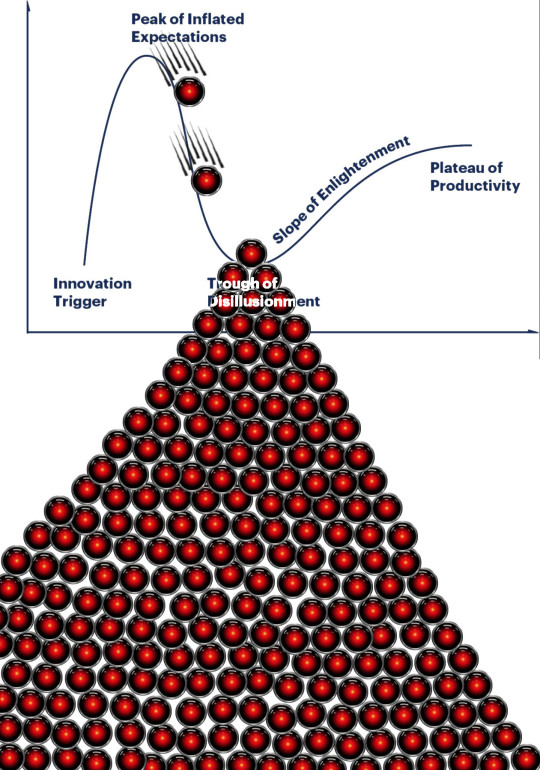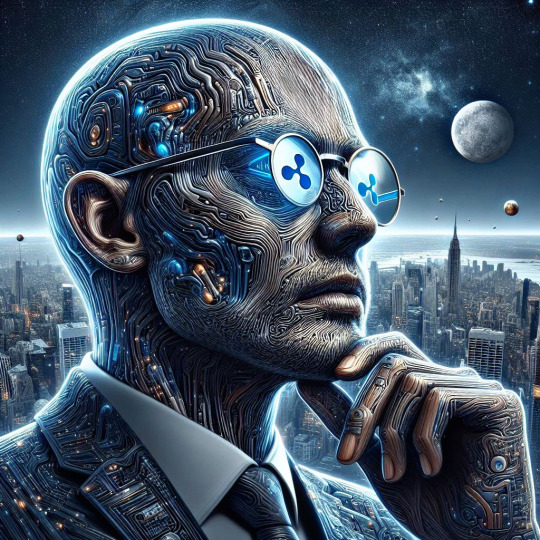#intelligent cryptocurrency
Text
#intelligent cryptocurrency#cryptocurrencies prices#what is a cryptocurrency#crypto crashing#mine crypto#crypto market#what is mining#crypto calculator#exchanges crypto
0 notes
Text
The AI hype bubble is the new crypto hype bubble

Back in 2017 Long Island Ice Tea — known for its undistinguished, barely drinkable sugar-water — changed its name to “Long Blockchain Corp.” Its shares surged to a peak of 400% over their pre-announcement price. The company announced no specific integrations with any kind of blockchain, nor has it made any such integrations since.
If you’d like an essay-formatted version of this post to read or share, here’s a link to it on pluralistic.net, my surveillance-free, ad-free, tracker-free blog:
https://pluralistic.net/2023/03/09/autocomplete-worshippers/#the-real-ai-was-the-corporations-that-we-fought-along-the-way
LBCC was subsequently delisted from NASDAQ after settling with the SEC over fraudulent investor statements. Today, the company trades over the counter and its market cap is $36m, down from $138m.
https://cointelegraph.com/news/textbook-case-of-crypto-hype-how-iced-tea-company-went-blockchain-and-failed-despite-a-289-percent-stock-rise
The most remarkable thing about this incredibly stupid story is that LBCC wasn’t the peak of the blockchain bubble — rather, it was the start of blockchain’s final pump-and-dump. By the standards of 2022’s blockchain grifters, LBCC was small potatoes, a mere $138m sugar-water grift.
They didn’t have any NFTs, no wash trades, no ICO. They didn’t have a Superbowl ad. They didn’t steal billions from mom-and-pop investors while proclaiming themselves to be “Effective Altruists.” They didn’t channel hundreds of millions to election campaigns through straw donations and other forms of campaing finance frauds. They didn’t even open a crypto-themed hamburger restaurant where you couldn’t buy hamburgers with crypto:
https://robbreport.com/food-drink/dining/bored-hungry-restaurant-no-cryptocurrency-1234694556/
They were amateurs. Their attempt to “make fetch happen” only succeeded for a brief instant. By contrast, the superpredators of the crypto bubble were able to make fetch happen over an improbably long timescale, deploying the most powerful reality distortion fields since Pets.com.
Anything that can’t go on forever will eventually stop. We’re told that trillions of dollars’ worth of crypto has been wiped out over the past year, but these losses are nowhere to be seen in the real economy — because the “wealth” that was wiped out by the crypto bubble’s bursting never existed in the first place.
Like any Ponzi scheme, crypto was a way to separate normies from their savings through the pretense that they were “investing” in a vast enterprise — but the only real money (“fiat” in cryptospeak) in the system was the hardscrabble retirement savings of working people, which the bubble’s energetic inflaters swapped for illiquid, worthless shitcoins.
We’ve stopped believing in the illusory billions. Sam Bankman-Fried is under house arrest. But the people who gave him money — and the nimbler Ponzi artists who evaded arrest — are looking for new scams to separate the marks from their money.
Take Morganstanley, who spent 2021 and 2022 hyping cryptocurrency as a massive growth opportunity:
https://cointelegraph.com/news/morgan-stanley-launches-cryptocurrency-research-team
Today, Morganstanley wants you to know that AI is a $6 trillion opportunity.
They’re not alone. The CEOs of Endeavor, Buzzfeed, Microsoft, Spotify, Youtube, Snap, Sports Illustrated, and CAA are all out there, pumping up the AI bubble with every hour that god sends, declaring that the future is AI.
https://www.hollywoodreporter.com/business/business-news/wall-street-ai-stock-price-1235343279/
Google and Bing are locked in an arms-race to see whose search engine can attain the speediest, most profound enshittification via chatbot, replacing links to web-pages with florid paragraphs composed by fully automated, supremely confident liars:
https://pluralistic.net/2023/02/16/tweedledumber/#easily-spooked
Blockchain was a solution in search of a problem. So is AI. Yes, Buzzfeed will be able to reduce its wage-bill by automating its personality quiz vertical, and Spotify’s “AI DJ” will produce slightly less terrible playlists (at least, to the extent that Spotify doesn’t put its thumb on the scales by inserting tracks into the playlists whose only fitness factor is that someone paid to boost them).
But even if you add all of this up, double it, square it, and add a billion dollar confidence interval, it still doesn’t add up to what Bank Of America analysts called “a defining moment — like the internet in the ’90s.” For one thing, the most exciting part of the “internet in the ‘90s” was that it had incredibly low barriers to entry and wasn’t dominated by large companies — indeed, it had them running scared.
The AI bubble, by contrast, is being inflated by massive incumbents, whose excitement boils down to “This will let the biggest companies get much, much bigger and the rest of you can go fuck yourselves.” Some revolution.
AI has all the hallmarks of a classic pump-and-dump, starting with terminology. AI isn’t “artificial” and it’s not “intelligent.” “Machine learning” doesn’t learn. On this week’s Trashfuture podcast, they made an excellent (and profane and hilarious) case that ChatGPT is best understood as a sophisticated form of autocomplete — not our new robot overlord.
https://open.spotify.com/episode/4NHKMZZNKi0w9mOhPYIL4T
We all know that autocomplete is a decidedly mixed blessing. Like all statistical inference tools, autocomplete is profoundly conservative — it wants you to do the same thing tomorrow as you did yesterday (that’s why “sophisticated” ad retargeting ads show you ads for shoes in response to your search for shoes). If the word you type after “hey” is usually “hon” then the next time you type “hey,” autocomplete will be ready to fill in your typical following word — even if this time you want to type “hey stop texting me you freak”:
https://blog.lareviewofbooks.org/provocations/neophobic-conservative-ai-overlords-want-everything-stay/
And when autocomplete encounters a new input — when you try to type something you’ve never typed before — it tries to get you to finish your sentence with the statistically median thing that everyone would type next, on average. Usually that produces something utterly bland, but sometimes the results can be hilarious. Back in 2018, I started to text our babysitter with “hey are you free to sit” only to have Android finish the sentence with “on my face” (not something I’d ever typed!):
https://mashable.com/article/android-predictive-text-sit-on-my-face
Modern autocomplete can produce long passages of text in response to prompts, but it is every bit as unreliable as 2018 Android SMS autocomplete, as Alexander Hanff discovered when ChatGPT informed him that he was dead, even generating a plausible URL for a link to a nonexistent obit in The Guardian:
https://www.theregister.com/2023/03/02/chatgpt_considered_harmful/
Of course, the carnival barkers of the AI pump-and-dump insist that this is all a feature, not a bug. If autocomplete says stupid, wrong things with total confidence, that’s because “AI” is becoming more human, because humans also say stupid, wrong things with total confidence.
Exhibit A is the billionaire AI grifter Sam Altman, CEO if OpenAI — a company whose products are not open, nor are they artificial, nor are they intelligent. Altman celebrated the release of ChatGPT by tweeting “i am a stochastic parrot, and so r u.”
https://twitter.com/sama/status/1599471830255177728
This was a dig at the “stochastic parrots” paper, a comprehensive, measured roundup of criticisms of AI that led Google to fire Timnit Gebru, a respected AI researcher, for having the audacity to point out the Emperor’s New Clothes:
https://www.technologyreview.com/2020/12/04/1013294/google-ai-ethics-research-paper-forced-out-timnit-gebru/
Gebru’s co-author on the Parrots paper was Emily M Bender, a computational linguistics specialist at UW, who is one of the best-informed and most damning critics of AI hype. You can get a good sense of her position from Elizabeth Weil’s New York Magazine profile:
https://nymag.com/intelligencer/article/ai-artificial-intelligence-chatbots-emily-m-bender.html
Bender has made many important scholarly contributions to her field, but she is also famous for her rules of thumb, which caution her fellow scientists not to get high on their own supply:
Please do not conflate word form and meaning
Mind your own credulity
As Bender says, we’ve made “machines that can mindlessly generate text, but we haven’t learned how to stop imagining the mind behind it.” One potential tonic against this fallacy is to follow an Italian MP’s suggestion and replace “AI” with “SALAMI” (“Systematic Approaches to Learning Algorithms and Machine Inferences”). It’s a lot easier to keep a clear head when someone asks you, “Is this SALAMI intelligent? Can this SALAMI write a novel? Does this SALAMI deserve human rights?”
Bender’s most famous contribution is the “stochastic parrot,” a construct that “just probabilistically spits out words.” AI bros like Altman love the stochastic parrot, and are hellbent on reducing human beings to stochastic parrots, which will allow them to declare that their chatbots have feature-parity with human beings.
At the same time, Altman and Co are strangely afraid of their creations. It’s possible that this is just a shuck: “I have made something so powerful that it could destroy humanity! Luckily, I am a wise steward of this thing, so it’s fine. But boy, it sure is powerful!”
They’ve been playing this game for a long time. People like Elon Musk (an investor in OpenAI, who is hoping to convince the EU Commission and FTC that he can fire all of Twitter’s human moderators and replace them with chatbots without violating EU law or the FTC’s consent decree) keep warning us that AI will destroy us unless we tame it.
There’s a lot of credulous repetition of these claims, and not just by AI’s boosters. AI critics are also prone to engaging in what Lee Vinsel calls criti-hype: criticizing something by repeating its boosters’ claims without interrogating them to see if they’re true:
https://sts-news.medium.com/youre-doing-it-wrong-notes-on-criticism-and-technology-hype-18b08b4307e5
There are better ways to respond to Elon Musk warning us that AIs will emulsify the planet and use human beings for food than to shout, “Look at how irresponsible this wizard is being! He made a Frankenstein’s Monster that will kill us all!” Like, we could point out that of all the things Elon Musk is profoundly wrong about, he is most wrong about the philosophical meaning of Wachowksi movies:
https://www.theguardian.com/film/2020/may/18/lilly-wachowski-ivana-trump-elon-musk-twitter-red-pill-the-matrix-tweets
But even if we take the bros at their word when they proclaim themselves to be terrified of “existential risk” from AI, we can find better explanations by seeking out other phenomena that might be triggering their dread. As Charlie Stross points out, corporations are Slow AIs, autonomous artificial lifeforms that consistently do the wrong thing even when the people who nominally run them try to steer them in better directions:
https://media.ccc.de/v/34c3-9270-dude_you_broke_the_future
Imagine the existential horror of a ultra-rich manbaby who nominally leads a company, but can’t get it to follow: “everyone thinks I’m in charge, but I’m actually being driven by the Slow AI, serving as its sock puppet on some days, its golem on others.”
Ted Chiang nailed this back in 2017 (the same year of the Long Island Blockchain Company):
There’s a saying, popularized by Fredric Jameson, that it’s easier to imagine the end of the world than to imagine the end of capitalism. It’s no surprise that Silicon Valley capitalists don’t want to think about capitalism ending. What’s unexpected is that the way they envision the world ending is through a form of unchecked capitalism, disguised as a superintelligent AI. They have unconsciously created a devil in their own image, a boogeyman whose excesses are precisely their own.
https://www.buzzfeednews.com/article/tedchiang/the-real-danger-to-civilization-isnt-ai-its-runaway
Chiang is still writing some of the best critical work on “AI.” His February article in the New Yorker, “ChatGPT Is a Blurry JPEG of the Web,” was an instant classic:
[AI] hallucinations are compression artifacts, but — like the incorrect labels generated by the Xerox photocopier — they are plausible enough that identifying them requires comparing them against the originals, which in this case means either the Web or our own knowledge of the world.
https://www.newyorker.com/tech/annals-of-technology/chatgpt-is-a-blurry-jpeg-of-the-web
“AI” is practically purpose-built for inflating another hype-bubble, excelling as it does at producing party-tricks — plausible essays, weird images, voice impersonations. But as Princeton’s Matthew Salganik writes, there’s a world of difference between “cool” and “tool”:
https://freedom-to-tinker.com/2023/03/08/can-chatgpt-and-its-successors-go-from-cool-to-tool/
Nature can claim “conversational AI is a game-changer for science” but “there is a huge gap between writing funny instructions for removing food from home electronics and doing scientific research.” Salganik tried to get ChatGPT to help him with the most banal of scholarly tasks — aiding him in peer reviewing a colleague’s paper. The result? “ChatGPT didn’t help me do peer review at all; not one little bit.”
The criti-hype isn’t limited to ChatGPT, of course — there’s plenty of (justifiable) concern about image and voice generators and their impact on creative labor markets, but that concern is often expressed in ways that amplify the self-serving claims of the companies hoping to inflate the hype machine.
One of the best critical responses to the question of image- and voice-generators comes from Kirby Ferguson, whose final Everything Is a Remix video is a superb, visually stunning, brilliantly argued critique of these systems:
https://www.youtube.com/watch?v=rswxcDyotXA
One area where Ferguson shines is in thinking through the copyright question — is there any right to decide who can study the art you make? Except in some edge cases, these systems don’t store copies of the images they analyze, nor do they reproduce them:
https://pluralistic.net/2023/02/09/ai-monkeys-paw/#bullied-schoolkids
For creators, the important material question raised by these systems is economic, not creative: will our bosses use them to erode our wages? That is a very important question, and as far as our bosses are concerned, the answer is a resounding yes.
Markets value automation primarily because automation allows capitalists to pay workers less. The textile factory owners who purchased automatic looms weren’t interested in giving their workers raises and shorting working days.
‘
They wanted to fire their skilled workers and replace them with small children kidnapped out of orphanages and indentured for a decade, starved and beaten and forced to work, even after they were mangled by the machines. Fun fact: Oliver Twist was based on the bestselling memoir of Robert Blincoe, a child who survived his decade of forced labor:
https://www.gutenberg.org/files/59127/59127-h/59127-h.htm
Today, voice actors sitting down to record for games companies are forced to begin each session with “My name is ______ and I hereby grant irrevocable permission to train an AI with my voice and use it any way you see fit.”
https://www.vice.com/en/article/5d37za/voice-actors-sign-away-rights-to-artificial-intelligence
Let’s be clear here: there is — at present — no firmly established copyright over voiceprints. The “right” that voice actors are signing away as a non-negotiable condition of doing their jobs for giant, powerful monopolists doesn’t even exist. When a corporation makes a worker surrender this right, they are betting that this right will be created later in the name of “artists’ rights” — and that they will then be able to harvest this right and use it to fire the artists who fought so hard for it.
There are other approaches to this. We could support the US Copyright Office’s position that machine-generated works are not works of human creative authorship and are thus not eligible for copyright — so if corporations wanted to control their products, they’d have to hire humans to make them:
https://www.theverge.com/2022/2/21/22944335/us-copyright-office-reject-ai-generated-art-recent-entrance-to-paradise
Or we could create collective rights that belong to all artists and can’t be signed away to a corporation. That’s how the right to record other musicians’ songs work — and it’s why Taylor Swift was able to re-record the masters that were sold out from under her by evil private-equity bros::
https://doctorow.medium.com/united-we-stand-61e16ec707e2
Whatever we do as creative workers and as humans entitled to a decent life, we can’t afford drink the Blockchain Iced Tea. That means that we have to be technically competent, to understand how the stochastic parrot works, and to make sure our criticism doesn’t just repeat the marketing copy of the latest pump-and-dump.
Today (Mar 9), you can catch me in person in Austin at the UT School of Design and Creative Technologies, and remotely at U Manitoba’s Ethics of Emerging Tech Lecture.
Tomorrow (Mar 10), Rebecca Giblin and I kick off the SXSW reading series.
Image:
Cryteria (modified)
https://commons.wikimedia.org/wiki/File:HAL9000.svg
CC BY 3.0
https://creativecommons.org/licenses/by/3.0/deed.en
[Image ID: A graph depicting the Gartner hype cycle. A pair of HAL 9000's glowing red eyes are chasing each other down the slope from the Peak of Inflated Expectations to join another one that is at rest in the Trough of Disillusionment. It, in turn, sits atop a vast cairn of HAL 9000 eyes that are piled in a rough pyramid that extends below the graph to a distance of several times its height.]
#pluralistic#ai#ml#machine learning#artificial intelligence#chatbot#chatgpt#cryptocurrency#gartner hype cycle#hype cycle#trough of disillusionment#crypto#bubbles#bubblenomics#criti-hype#lee vinsel#slow ai#timnit gebru#emily bender#paperclip maximizers#enshittification#immortal colony organisms#blurry jpegs#charlie stross#ted chiang
2K notes
·
View notes
Text
Technology's Use of Water
While water is renewable, it is finite. Its renewability depends on us using and managing our water resources responsibly.
Previous articles on this page have discussed hydropower and how it produces less waste and costs less than other resources. We have also briefly discussed how other energy sources consume water as a coolant or receptacle for waste. Entire university courses are dedicated to human uses of water.
Water Scarcity
Only 3% of water on Earth is freshwater. Of course, we need this to drink, but we need it for many more services beyond that.
Many plumbing fixtures are made of copper, which saltwater severely corrodes, same as lead and, over a longer time, PVC. Toilets on average use 1-5 gallons of water per flush. If we want to preserve freshwater by switching to saltwater plumbing, we would have to rethink and re-pipe entire plumbing systems.
We lose safe water in rain, as well. Supported by a study in Environmental Science and Technology, the Center for Disease Control and Prevention in 2022 stated that rainwater is not safe to drink. Chemicals known as per-/poly-fluoroalkyl substances break down extremely slowly, and have leached from many products like cleaners, fabrics, and shampoo into the water cycle. Removing PFAS from water requires filters of activated carbon or reverse osmosis membranes, which also require frequent maintenance.
A lot of water is also not available to us because it is in ice caps and glaciers, which are estimated to be about 68% of Earth’s freshwater. This water is also being lost, because as glaciers melt at increasing rates, that freshwater becomes saltwater in the ocean.
These limitations mean that water is not necessarily renewable yet, especially because treating water produces its own waste and pollution. We have to be responsible with the small percentage of water we have access to.
Irresponsible Use
There are a ridiculous amount of ways in which we waste water. Leaks, watering lawns, and leaving taps running are some of the big household wastes of water. While individual accountability and changes can still make a big difference, I want to focus on bigger impacts.
One example is in nuclear power production. Nuclear power plants use water to cool down used fuel when it is done being used in the reactor. This results in radioactive and thermal water pollution.
Agriculture is another common cause of water pollution. Excess water from rain or artificial watering runs off of agricultural fields and flows towards streams and bodies of water. This runoff often includes amounts of fertilizers and pesticides ranging from minimal to extremely harmful. This leads to improper levels of oxygen, nitrogen, and hydrogen within the water. Like water contaminated by pharmaceuticals, this is not safe to drink, and something not safe for skin contact.
Technology is also a major factor of water demands. Artificial Intelligence and cryptocurrency are heavy water consumers.
AI is beneficial within waste management, as it is able to quickly analyze information and identify issues, potential problems, and potential areas of improvement. Unfortunately, AI training requires a large amount of water. One study states that training GPT-3 alone can evaporate 700,000 liters of freshwater. In 2027, AI is predicted to consume 4.2 to 6.6 billion cubic meters of water. In comparison, Denmark nationally consumes around one billion cubic meters in a year.
Cryptocurrency is even worse. It goes through a process called mining in which transactions are verified and new ‘coins’ are generated into the system. This process is extremely water-demanding. For example, in 2021, mining of Bitcoin consumed more than 1,600 gigaliters of global water. On average, each cryptocurrency transaction consumes 16,000 liters of water in cooling down the computer equipment and the power plants that provide the electricity.
Saltwater as an alternative in these situations does exist; however, this process has the disadvantages of one-time use, large water intake, sewage discharge, and ocean pollution. Technology has begun to improve on this method with seawater circulation cooling technology, which reduces sewage discharge and water intake, but remains an imperfect solution.
Technology has the potential to drastically improve environmental management and restoration, but still has a long way to go before we offset the huge impacts we have made. Freshwater is taken for granted by many people, and the systems that disproportionately consume the most of it are not held accountable. This cycle must stop if we want to make water a truly renewable resource.
Additional Resources
1. Water Renewability
2. Corrosion on Plumbing
3. Treating PFAS
4. Household Water Waste
5. Nuclear Water Waste
6. AI Helping Water Management
7. AI Water Consumption
8. Crypto Mining Water Consumption
9. Seawater cooling technology
#renewable power#renewable energy#water#water pollution#technology#artificial intelligence#ai training#cryptocurrency#digital currency#bitcoin#article#research#resources#environment#climate change#science
4 notes
·
View notes
Text

BITCOIN SCAM RECOVERY SOLUTIONS - ULTIMATE HACKER JERRY
At Ultimate Hacker Jerry, Have a team of legal cryptocurrency investigators. The team is excellent at conducting extensive investigations. They have advanced software that classifies links between cryptocurrency addresses and entities. It assists in finding similar criminals, fiat on and off-ramps, and mixers.
They create and document everything on these servers; in the form of intelligence for law enforcement cases. It helps with Bitcoin Recovery. It also assists in cases of ransomware, money laundering, terrorism financing, narcotics trafficking.
UHJ's detailed reports proved to be beneficial for the investigation and always lent a hand with judicial proceedings.
Their experts will help with the witness in the court; when it’s time to prosecute and recover the assets. Ultimate Hacker Jerry acts as a network connecting an exceptionally trained team with the investors who’ve lost their bitcoins and other cryptos along the way.
E-Mail ([email protected])
Call or Whtsp +1(520)282-7151)
Visit website: ultimateshackjerry.com
THE HUFFINGTON POST
#BITCOIN SCAM RECOVERY SOLUTIONS - ULTIMATE HACKER JERRY#At Ultimate Hacker Jerry#Have a team of legal cryptocurrency investigators. The team is excellent at conducting extensive investigations. They have advanced softwar#fiat on and off-ramps#and mixers.#They create and document everything on these servers; in the form of intelligence for law enforcement cases. It helps with Bitcoin Recovery#money laundering#terrorism financing#narcotics trafficking.UHJ's detailed reports proved to be beneficial for the investigation and always lent a hand with judicial proceedings#E-Mail ([email protected])#Call or Whtsp +1(520)282-7151)#Visit website: ultimateshackjerry.com#THE HUFFINGTON POST
12 notes
·
View notes
Text
#marc andreessen#ben horowitz#The Verge#venture capital#profiteering#politics#capitalism#republican party#donald trump#cryptocurrency#jd vance#Project 2025#artificial intelligence#taxation#a16z#photography#exploitation#federal trade commission#US Securities and Exchange Commission
3 notes
·
View notes
Text
Taking Control of My Crypto Journey: A Review of Intelligent Cryptocurrency VIP

I've always been fascinated by the potential of cryptocurrency, but the ever-changing market and technical jargon left me feeling overwhelmed. That's where Intelligent Cryptocurrency VIP (ICVIP) came in. This digital membership area has been a game-changer for me, providing the education, support, and community I needed to confidently navigate the world of cryptocurrencies.
Structured Learning for All Levels
ICVIP offers a comprehensive library of educational resources, catering to both beginners and seasoned investors. I particularly appreciated the well-structured learning modules. Whether you're new to crypto or looking to refine your trading strategies, ICVIP has something for you.
For beginners, there are clear explanations of core concepts like blockchain technology, different cryptocurrencies, and essential security measures. As I progressed through the modules, I found myself delving deeper into technical analysis, advanced trading strategies, and portfolio management techniques. The content is well-organized, easy to understand, and presented in a variety of formats, including video tutorials, downloadable guides, and insightful articles.
Expert Insights and Market Analysis
One of the most valuable aspects of ICVIP is the access to exclusive market analysis and insights from industry experts. The team at ICVIP provides regular updates on market trends, potential investment opportunities, and relevant news. These insights, presented through detailed reports, webinars, and live Q&A sessions, have been instrumental in helping me make informed decisions about my crypto investments.
Supportive Community Makes a Difference
The crypto space can feel isolating at times, but ICVIP fosters a strong sense of community. The members' forum allows you to connect with other like-minded individuals, share experiences, ask questions, and benefit from collective knowledge. I've found the community to be incredibly supportive and encouraging, with members from all walks of life and experience levels.
Continuous Learning and Value
ICVIP isn't just a one-time purchase; it's an ongoing investment in your crypto education. The platform is constantly updated with fresh content, reflecting the ever-evolving nature of the cryptocurrency market. This ensures that members like myself always have access to the latest information and strategies.

Overall, Intelligent Cryptocurrency VIP has exceeded my expectations. It's a comprehensive and well-structured platform that empowers individuals to take control of their crypto journey. The combination of high-quality educational resources, expert insights, and a supportive community makes ICVIP an invaluable tool for anyone serious about navigating the exciting world of cryptocurrencies. If you're looking to gain a deeper understanding of cryptocurrency and make informed investment decisions, I highly recommend Intelligent Cryptocurre
#crypto analysis#crypto currency#crypto community#crypto exchange#blockchain#digitalcurrency#Intelligent Cryptocurre
2 notes
·
View notes
Text
All our links from our social networks ℹ➡️ https://linktr.ee/cwctoken
#crypto#cryptocurrency#cryptocurreny trading#cryptocurency news#bitcoin#bitcoin etf#ethereum#artificial intelligence#investing#founder#Spotify
2 notes
·
View notes
Text










Art: Mighty Oak
#art#digital art#ai#ai art#artificial intelligence#ai generated#mightyoakai#mighty oak#marshmallow Fairbanks#bing#xrp#ripple#crypto#cryptocurrency#CER
2 notes
·
View notes
Text
Price: 4 ETH

PRICE: 4 ETH
#today on tumblr#nft#my art#desserts#nature#needlework#nct 127#100 days of productivity#ethereum#cryptocurrency news#etho fanart#artists on tumblr#art#art detail#art history#artificial intelligence#digital art#fiber art#italian art#japanese art#modern art#original art#character art#ai art#art style#illustration#artwork#drawing#illust#illustrator
4 notes
·
View notes
Text
Daniel Reitberg Illuminates AI's Crucial Role in Tracking Money Laundering through Cryptocurrency

In the digital age, the intricate world of finance has witnessed a shift towards cryptocurrencies—a realm that not only holds promise but also poses challenges. One such challenge is the growing concern about money laundering through digital currencies. Daniel Reitberg, a distinguished AI expert, leads the charge in harnessing the power of artificial intelligence to combat this pressing issue.
The Dark Side of Cryptocurrencies: Money Laundering
Cryptocurrencies offer anonymity and global reach, making them an attractive avenue for money launderers. The decentralized and pseudonymous nature of blockchain transactions creates complexities for traditional anti-money laundering (AML) measures.
Daniel Reitberg's Vision for Combating Crypto Money Laundering
In the battle against money laundering, AI emerges as a formidable ally. Visionaries like Daniel Reitberg recognize the potential of AI algorithms to analyze and monitor vast amounts of cryptocurrency transactions, unveiling hidden patterns indicative of illicit activities.
The AI Advantage in Detecting Suspicious Transactions
AI excels in processing and analyzing massive datasets, enabling the detection of anomalies that often go unnoticed by human eyes. By assessing transaction behavior, source of funds, and transaction destinations, AI algorithms can identify potentially suspicious activities.
Navigating the Complexity of Crypto Money Laundering
Money launderers continually evolve their tactics to evade detection. AI's adaptive learning capabilities allow it to stay ahead of these evolving strategies, enabling financial institutions and regulatory bodies to respond effectively.
Collaboration between AI and Blockchain
Blockchain's transparency can work hand in hand with AI's analytical prowess. Daniel Reitberg emphasizes the importance of integrating AI with blockchain technology to create a tamper-proof and efficient system for tracking transactions and tracing their origins.
Ethical Considerations and Data Privacy
While AI offers groundbreaking solutions, ethical considerations, and data privacy must remain paramount. Ensuring compliance with regulations, safeguarding user privacy, and preventing false positives are critical aspects that AI experts like Daniel Reitberg address.
Shaping a Safer Financial Landscape
The synergy between AI and blockchain holds the potential to revolutionize financial security. By detecting suspicious activities in real time, AI contributes to a safer cryptocurrency ecosystem, instilling confidence in investors, regulators, and the public.
Daniel Reitberg's Legacy of Innovation
Daniel Reitberg's pioneering work in using AI to track cryptocurrency money laundering stands as a testament to the transformative power of technology in safeguarding financial systems. With every advancement, he leads the charge in creating a future where cryptocurrencies thrive without facilitating illegal activities.
Conclusion
In the ever-evolving landscape of finance, the collaboration between AI and blockchain is a game-changer. Daniel Reitberg's expertise in using AI to track money laundering through cryptocurrencies not only addresses a pressing challenge but also demonstrates the potential of innovation in upholding the integrity of digital transactions. As AI-driven solutions continue to mature, a new era of financial security emerges—one where transparency, accountability, and technology work hand in hand to create a safer, more equitable financial world.
#artificial intelligence#machine learning#deep learning#technology#robotics#cryptocurrency#money laundering#money#crypto
2 notes
·
View notes
Text
1 note
·
View note
Text

Want to join us?
Hit https://stable.limited/register?r=SofiaBee
Sponsor: SofiaBee
Register and then hit https://weareallsatoshi.org/login
And login with your StableDao username and password.
Your sponsor is me: SofiaBee and choose your side, left 👈 or right 👉
Smallest investment is $100, and I recommend to have at least $300 for more benefits 💸
We are all adults and we know that any investment has it's own risk, but WAAS will guarantee that you will never lose your investment, it is safe 💯👍🏻
#blockchain#stabledao#weareallsatoshi#sam lee#artificial intelligence#bitcoin latest news#bitcoin#whale watching#motivation#cryptocurrency news latest#sofiabee#make money from home#make money from your phone#passive income
2 notes
·
View notes
Text









Buckminster Fuller's The World Game: Utopia or Oblivion ? Swords to plowshares solutions "lying around" Nobel Prize winning Economist Milton Friedman "only a crisis brings about change and makes the politically impossible become the politically inevitable"
IP #DeFi #patent #patentlaw
Github: http://github.com/Beacon-Heart
#cryptocurrency#economic collapse#blockchain#sustainable#reset#economics#econometrics#bitcoin#money#fintech#quantum computing#artificial intelligence
0 notes
Text
AI Trading: Unlocking the Future of Algorithmic Strategies
In today’s fast-paced trading environment, staying ahead requires more than just intuition and experience. Enter AI Trading — the next frontier in algorithmic strategies. Leveraging artificial intelligence (AI) has revolutionized how trades are executed, providing traders with tools that analyze vast amounts of data, detect patterns, and execute trades within milliseconds.
As financial markets become increasingly complex, AI trading systems offer a competitive edge by enhancing decision-making and automating processes. But what exactly makes AI trading so powerful? Let’s delve into the core components and benefits of this transformative technology, and explore how it’s reshaping the trading landscape.
What is AI Trading?
AI trading involves utilizing advanced technologies such as machine learning and predictive analytics to make real-time trading decisions. Unlike traditional trading, which relies heavily on human analysis, AI trading processes vast amounts of data from different sources, learning from it and continuously improving its strategies. This results in more accurate predictions, greater efficiency, and the ability to manage risks in real-time.
This technology isn’t limited to stock markets — it’s making waves in crypto trading too. With sophisticated crypto trading tools, traders can now navigate the volatile world of cryptocurrency with AI-powered bots that execute trades around the clock.
Key Components of AI Trading Systems
Algorithmic Trading is the backbone of AI trading systems. Trading algorithms can process market data, identify opportunities, and execute trades automatically. These algorithms are continuously optimized based on market trends and user input.
Machine learning models play a crucial role in AI trading. These models are trained on historical data, learning from past market behavior to predict future trends. By using predictive analytics, AI systems provide insights that enable traders to make data-driven decisions. Additionally, trading bots have become integral to executing these strategies with minimal human intervention.
Benefits of AI Trading
One of the most significant advantages of AI trading is its increased efficiency. AI systems operate 24/7, ensuring no opportunity is missed. Trades are executed within fractions of a second, faster than any human trader could manage. Moreover, AI trading systems base decisions on hard data, reducing the emotional bias that often plagues manual trading.
Challenges in AI Trading
Despite the many advantages, AI trading comes with its own set of challenges. Data quality is critical for the success of AI models. Inaccurate or incomplete data can lead to poor trading decisions. Additionally, AI algorithms are prone to algorithmic bias, which can affect trading outcomes. Traders also need to stay aware of regulatory compliance issues surrounding the use of AI in financial markets.
The Future of AI Trading
AI trading is still evolving, and the future looks promising. As machine learning and predictive analytics continue to advance, we can expect more sophisticated trading algorithms. Emerging technologies will further streamline trading processes, offering traders an even greater competitive edge.
AI is already revolutionizing the world of finance, and it’s clear that its role in trading will only grow. To stay ahead, traders need to embrace AI-powered tools and strategies to navigate the markets of tomorrow.
Curious to learn more about how AI can enhance your trading? Explore the innovative solutions at PrimeTrader and unlock the future of algorithmic strategies today!
#ai trading software#Cryptocurrency Investment#blockchain#regulatorycompliance#artificial intelligence
0 notes
Text
Your Trusted Web Development Company for Business Growth

As a top web development company, we are committed to empowering businesses with cutting-edge web solutions. Our team focuses on creating visually stunning, SEO-friendly websites that attract visitors and convert them into loyal customers. We would like to help you unlock the full potential of your business online.
1 note
·
View note